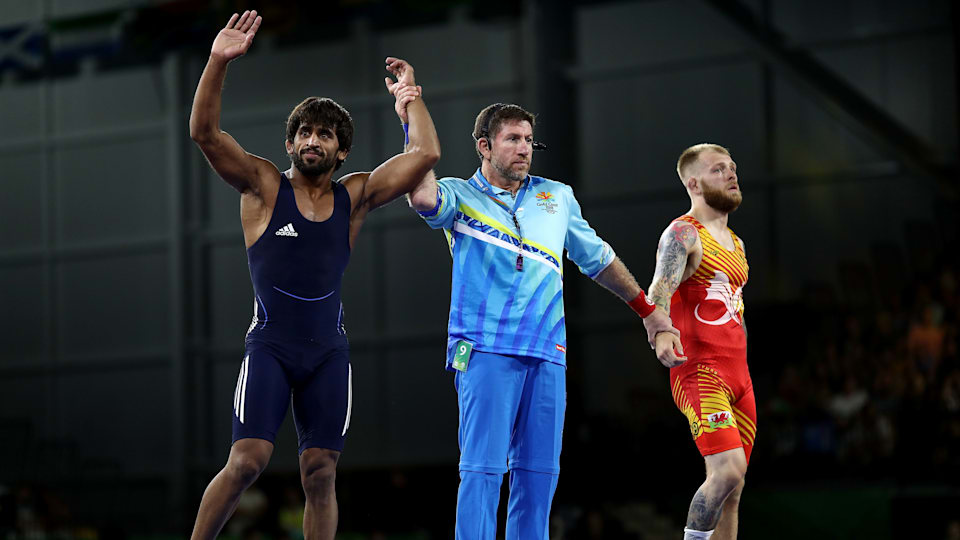Bajrang Punia aiming to emulate idol Yogeshwar Dutt
After voluntarily giving up his Olympic chance to Dutt in 2016, Bajrang Punia will finally get to go for his own medal at the Games.

Bajrang Punia’s trophy cabinet is a treasure trove of dreams for any aspiring wrestler, as the shelves are adorned by medals won in everything from the World Championships to the Commonwealth Games.
However, one prize has still eluded the Indian wrestler and it is the grandest of them all — an Olympic medal.
It is that vacancy which Bajrang Punia hopes to fill at Tokyo 2020, for which he qualified by winning bronze for India at the 2019 World Championships in Kazakhstan.
Yogi worship
Doing so would put him on par with his idol, 2012 London Olympics bronze-medallist Yogeshwar Dutt, for whom Bajrang Punia’s respect ran so high that he backed out of the 2016 Rio Olympics, so Dutt, belonging to the same 60kg weight category, could go instead.
“I never want anything to come between me and Yogi bhai and I always want to see him progress ahead in life,” Bajrang Punia told the Olympic Channel. “He has brought way too many medals for the country and I never want to face him in a bout, even at a stage like (the) Olympics.”
Observing Yogeshwar Dutt
Bajrang was selected from wrestling coach Virender Kumar’s akhada (wrestling pit) in 2005 to train professionally on the mat, where Sushil Kumar and Yogeshwar Dutt also honed their craft.
During that time, while Bajrang was forging the outline of his career, Yogeshwar Dutt, despite having lost his father and suffered a knee injury, won a bronze medal in the 60kg freestyle category at the 2006 Asian Games.
For Bajrang Punia, it was around that point that he began to see Yogeshwar Dutt as someone to emulate. “That is when I observed how he would wrestle on the mat and followed in his footsteps since then. He became a role model for me since then,” said Punia.
Bajrang Punia got his chance to work up close with his idol when Punia was brought to Chhatrasal Stadium in 2008.
At first, he would stick to watching Dutt at work.
“I only used to observe him in my early days in 2008, because I used to wrestle in the 42kg category while he would wrestle under the 60kg,” said Punia as he recounted those early days.
“I used to learn exercises like chin-ups, sit-ups and everything else from him. My goal at that time was to only stick around and observe.”
What goes around comes around for Bajrang Punia
Eventually, as Bajrang Punia started to participate in more international tournaments and earn a name of his own, he increasingly trained alongside Dutt, who fulfilled his duty as an unofficial mentor to the up-and-coming Punia.
“In 2012, when I won a gold in the nationals was when I started sparring with Yogi bhai. He would guide me and correct me if my form went wrong somewhere. His support is still with me even today,” he said enthusiastically.
Today, as Bajrang Punia prepares for his first-ever opportunity to win an Olympic medal, Deepak Punia, another young wrestler from Haryana’s Jhajjar district, turns to him whenever he has a doubt.
What does Bajrang Punia feel about now being on the other side of the relationship?
“It is every athlete’s trait to find a role model before they set the course of their new journey. I believe Yogeshwar Dutt to be my role model and today I feel honoured to be a role model to Deepak.”
What’s next for Bajrang Punia?
After securing his spot at the 2020 Olympics last year, Bajrang Punia had a mixed start to the new year.
After winning a gold medal in the 65kg freestyle category in the Matteo Pellicone Memorial — the season’s first ranking event, he lost to Japan’s Takuto Otoguro at the Asian Wrestling Championships.
With the coronavirus outbreak now putting a stop to sporting events around the world, Bajrang Punia’s next confirmed outing is the 2020 Olympics itself, where he will be hoping to emulate, or perhaps better, his idol Yogeshwar Dutt’s bronze medal.
